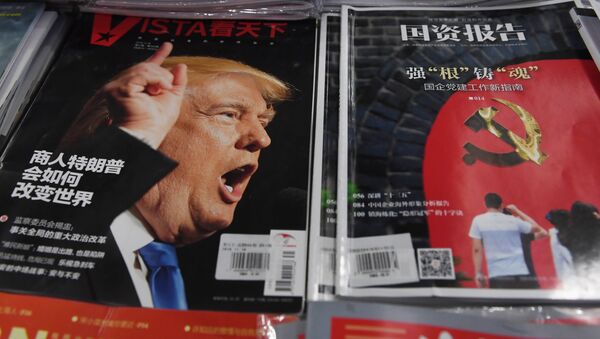Speaking at the New Economy Forum on Thursday in Beijing ex-US Secretary of State Henry Kissinger said that the US and China were in the "foothills of a Cold War", adding that it's not too late to mend fences.
"The First World War broke out because a relatively minor crisis could not be mastered", Kissinger warned.
"We're still in the foothills" of a U.S.-China cold war, says Henry Kissinger https://t.co/te81BFAB0r #NewEconForum pic.twitter.com/x1KwoQILMl
— Bloomberg New Economy Forum (@neweconforum) November 21, 2019
The forum, established by American billionaire Michael Bloomberg in 2018, brought together thinkers and businessmen and former officials including former US Treasury Secretary Hank Paulson, former Chair of the US Federal Reserve Janet Yelle, Microsoft founder Bill Gates, and Alibaba Group Chairman Jack Ma to name just a few.
Addressing the event, Chinese Vice President Wang Qishan reiterated China's commitment to market-based economy, reforms and peaceful development, stressing that the international global order is currently "under threat" due to protectionism and populism.
"We should continue advocating multilateralism and democratisation of international relations, building up a fair and reasonable global governance mechanism", Wang emphasised.
US-China All-Out Rivalry Can Jeopardise Global Stability & Prosperity
Although Wang did not name any particular state actor responsible for the current protectionist trend, his comments were an apparent reference to the ongoing US-China trade frictions.
According to Zhu Feng, director of the Centre of International Studies at Nanjing University, in the last few years the US has stepped up its criticism of the People's Republic.
"I think the US, especially the Trump administration, should correctly assess the capabilities of China, and develop appropriate policies", Zhu said. "Today Washington regards China as a force that is equal to or even surpasses the United States. But in reality, the US is still superior to China in many areas, so the US is unrealistic in its assessments of China".
Having admitted that a complete transformation of Washington's attitude towards Beijing appears unlikely, the Chinese scholar underscores that the US needs to realise that an all-out rivalry with China could harm not on US-China bilateral relations but jeopardise global stability and prosperity.
"The US strategic planning needs to be adjusted. There is no need to exaggerate China's advantages. It is necessary to adequately assess Sino-American competition", argues Zhu.
Although the US-China trade war erupted in March 2018 over the Trump administration's discontent with a trade imbalance, the economic confrontation between Washington and Beijing quickly spilled over to other spheres. Besides raising the issue of the alleged violation of intellectual property rights by the Chinese as well as market access barriers, the US went for the country's telecom giant Huawei, accusing it of spying on behalf of the Chinese government. The telecom giant has denied the allegations.
Washington called upon its allies, including the Five Eyes group, to prohibit the use of Huawei's 5G equipment in the cores of their telecom networks citing the alleged security threat. In May 2019, the US added Huawei and its affiliates to a black list after the US-China trade talks stalled. However, following the ban the Trump administration introduced a waiver for firms involved in cooperating with Huawei.
On 20 November, the White House granted Huawei a second reprieve, allowing some suppliers to resume sales to the Chinese tech company following the aforementioned ban. Earlier this week, the Commerce Department renewed the so-called temporary general license for Huawei for a third time. The move came amid expectations that the US and China may sign a "phase one" trade deal in the near future.




